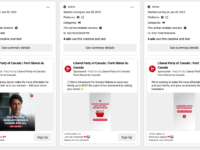The government moved to escalate the battle over Bill C-18 yesterday, announcing that it was suspending advertising on Meta’s Facebook and Instagram platforms due the company’s decision to comply with the bill by blocking news sharing and its reluctance to further negotiate the issue. While the ad ban applies to federal government advertising, Liberal party officials confirmed they plan to continue political advertising on the social networks, suggesting that principled opposition ends when there might be a political cost involved. At issue is roughly $11 million in annual advertising by the federal government, a sum that pales in comparison to the Parliamentary Budget Officer’s estimate of at least $100 million in payments in Canada for news links from Meta alone.
Post Tagged with: "meta"
A Massive Own-Goal for the Government: Google to Stop News Links in Canada Due to Bill C-18
The worst case scenario for Canadian Heritage Minister Pablo Rodriguez, the Canadian news sector, and the Canadian public has come to pass: Google has announced that it will block news links in Canada in response to the mandated payment for links approach established in Bill C-18. The decision, which the company says will be implemented before the law takes effect, will cover search, Google News, and Google Discover. The decision – which government seemingly tried to avoid with last minute discussions with Google executives after it became apparent that the risks of exit were real – will have lasting and enormously damaging consequences for Canadians and represents a remarkable own-goal by Rodriguez who has managed to take millions away from the news sector and left everyone in a far worse position than if he had done nothing at all.
The Damage Continues to Grow: Meta Begins Cancelling Existing Media Deals In Light of Bill C-18
The damage caused by the government’s Bill C-18 continues to grow as Meta has started to cancel its existing agreements with Canadian publishers. The move should not come as a surprise since any deals that involve facilitating access to news content would bring the company into the legislative framework and mandate payments for links. Indeed, Meta said earlier this week that its 18 existing deals “did not have much of a future.” When this is coupled with a reported “impasse” between the government and Google over its approach to Bill C-18, the risks to the Canadian media sector look increasingly dire.
Media Chaos: How the Government’s Legislative Plans to Support Canadian Media Have Backfired Spectacularly
The Online News Act may be only days removed from having received royal assent, but the government’s plans to support the Canadian media sector have already backfired spectacularly. While it claimed its Bill C-18 would add millions of dollars to the sector and support struggling media companies, the reality has quickly intervened: blocked news sharing on Internet platforms with cancelled deals on the horizon, reports of direct corporate intervention in news departments, massive layoffs and regulatory requests to decrease spending on news, and now a nightmare merger proposal between Postmedia and Torstar. And that is just over the past week. Canadian Heritage Minister Pablo Rodriguez has amply demonstrated that there is no Plan B, offering up the prospect of further dependence on government through more public spending to mitigate the harms from his massive miscalculations. Not all of this is the government’s doing, but having relied on empty assurances that blocked news sharing was merely a bluff, Rodriguez picked politics and tough talk over good policy and is now left with media chaos.
Buyer’s Remorse?: The Risks of Bill C-18 Leading to Blocked News Sharing Becoming Real to Canadian Media
When Le Devoir director Brian Myles appeared before the Senate committee studying Bill C-18 last month, he closed by urging the committee to pass the legislation quickly, stating “the time to act is now. We can’t wait two years between the passage of the bill and the CRTC regulations, because the delay will benefit opponents, giving them time to organize and undermine the spirit and the letter of the law.” While Myles acknowledged that claims regarding “theft” of news content by Internet platforms was overstated, he nevertheless expressed full support for the bill. One month later, the Online News Act is now law, Meta has confirmed that it will block news sharing before it takes effect, and the government is reportedly in last ditch negotiations with Google to stop it from doing the same.


Recent Posts
 The Law Bytes Podcast, Episode 231: Sara Bannerman on How Canadian Political Parties Maximize Voter Data Collection and Minimize Privacy Safeguards
The Law Bytes Podcast, Episode 231: Sara Bannerman on How Canadian Political Parties Maximize Voter Data Collection and Minimize Privacy Safeguards  The Law Bytes Podcast, Episode 230: Aengus Bridgman on the 2025 Federal Election, Social Media Platforms, and Misinformation
The Law Bytes Podcast, Episode 230: Aengus Bridgman on the 2025 Federal Election, Social Media Platforms, and Misinformation  The Law Bytes Podcast, Episode 229: My Digital Access Day Keynote – Assessing the Canadian Digital Policy Record
The Law Bytes Podcast, Episode 229: My Digital Access Day Keynote – Assessing the Canadian Digital Policy Record  Queen’s University Trustees Reject Divestment Efforts Emphasizing the Importance of Institutional Neutrality
Queen’s University Trustees Reject Divestment Efforts Emphasizing the Importance of Institutional Neutrality  The Law Bytes Podcast, Episode 228: Kumanan Wilson on Why Canadian Health Data Requires Stronger Privacy Protection in the Trump Era
The Law Bytes Podcast, Episode 228: Kumanan Wilson on Why Canadian Health Data Requires Stronger Privacy Protection in the Trump Era
Michael Geist on Substack
Get Postings via Email
Open Books
Broadcasting and Telecom Legislative Review Panel Report (BTLR)
Archives
| S | M | T | W | T | F | S |
|---|---|---|---|---|---|---|
| 1 | 2 | 3 | 4 | 5 | ||
| 6 | 7 | 8 | 9 | 10 | 11 | 12 |
| 13 | 14 | 15 | 16 | 17 | 18 | 19 |
| 20 | 21 | 22 | 23 | 24 | 25 | 26 |
| 27 | 28 | 29 | 30 | |||





